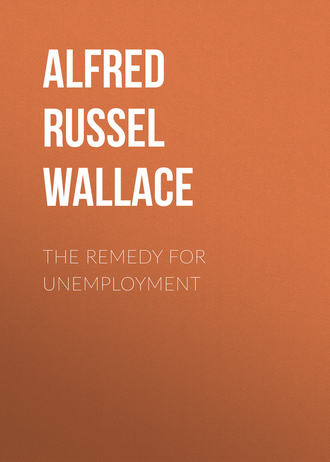
Alfred Russel Wallace
The Remedy for Unemployment
The chief reason why Mr. Mills’ scheme, if embodied in a Bill, should, and I think would, receive the support of a large majority in the present House of Commons is, that it utilises and combines in an admirable manner the most important, and at the same time the least disputable, methods of both Socialism and Individualism. To illustrate this I will give a few condensed extracts from his summary of the main features of his proposals, with some remarks of my own.
(1) In each county or union, tracts of land from 2,000 acres upwards shall be purchased or taken over by the State or Local Authority, and be prepared with suitable houses, buildings, tools, machines, etc., for the accommodation of about 4,000 or 5,000 occupants, men, women, and children; with skilled foremen and organisers to carry out the various operations of agriculture, and the trades and manufactures required to produce food, clothing, and other necessaries for the inhabitants.
(2) It is shown, by the facts and calculations of experts, that the labour of a properly assorted population, for four hours daily, will, when in full working order (say after a year), produce all the necessaries of life in abundance. One hour more is added for the costs of skilled supervision and another hour for the maintenance and schooling of the children, and for the support of the aged and the sick as they arise.
(3) In order to effect this the ordinary methods and rules of the best kinds of industrial work must be adopted; but, after working hours, all will be as completely free from control by the various industrial officials as the people of any prosperous and well-ordered town or village.
(4) That the director of each of the Co-operative estates shall encourage the workers to make their homes and work-places as healthful, convenient, and beautiful as possible, giving them advice as to how this can best be done, and assistance in doing it.
(5) That for work done co-operatively no money wages shall be paid, the equivalent of such work being the whole net produce of the labour. This will be—the provision of comfortable homes, abundance of good food and fuel, with a good supply of clothing, the latter being chosen by each person from a variety of suitable material and design kept in the stores. In addition to this, the children would all receive the best education, and as they grew up would each be trained in accordance with their faculties or tastes, in two or three useful occupations.
At least four-fifths of all the work on the estate shall be done for home consumption, not for sale.
(6) Every worker will be enabled to employ his spare time for his own use or profit, so as to obtain any luxuries or pleasures he might desire. Some would have land on which to raise choice fruits or vegetables for sale; others a workshop; the young women might do dressmaking, or open shops for the supply of small luxuries not produced co-operatively. All they required would be supplied at wholesale price, to be repaid by instalments out of the profits.
On this subject Mr. Mills well remarks: “I can easily imagine that for the sake of the retriever, the pigeons, the tobacco, the poultry or rabbits, the greenhouse, the bicycle, the piano, the library, the concert, or the theatre, many morning and evening industries would spring up quickly, without any other stimulus from the director than that which exists in every human heart. The acquisition of the luxuries of life might well be left to the ingenuity and activity of private enterprise.”
I would myself further suggest that the rules and restrictions on these estates should be as few as possible, and only such as are absolutely essential for the comfort and well-being of all. Especially should all healthful amusements and social enjoyments be provided for; while such serious offences as repeated drunkenness, immorality, or violence should be punished by absolute dismissal or expulsion.
It should be made quite clear from the first that these estates or colonies are established for the provision of permanent and enjoyable homes for all who desired to take advantage of them, not as mere temporary shelters in times of depression. There would, of course, be no compulsion to remain, but anyone who was dissatisfied with his surroundings and left could not again be admitted.
Another point of importance is, that the organisation of the whole community under an official director, whose rule must necessarily at first be despotic, is not intended to be permanent. When the colony became thoroughly self-supporting, and its inhabitants fully appreciated the benefits they enjoyed under the co-operative system, and had been gradually trained in the principles and methods essential to success, the organisation would be steadily modified in the direction of a self-governing community.
With this end in view, the Director, as well as the several heads of departments of industry, would, after the first year, each choose a few of the more intelligent and industrious workers to form small Consultative Committees. With these he would hold informal weekly meetings, to talk over the special affairs of their departments, and consider whether any improvements in organisation were advisable, either in the interests of the workers themselves or of the whole community who consumed or utilised the products of the work. Later on these committees might be added to by the introduction of workers chosen to represent the rest; or, perhaps better still, by the admission of those who had been longest in the community, and were therefore best acquainted with the needs and wishes of all its members. These would automatically become members after a certain period of work, the older retiring as the younger entered, and would ultimately constitute the whole committee. Suggestion-books should also be kept in the public rooms, in which every member, without exception, could, if he wished, make proposals or suggestions on any matter affecting the well-being of the whole community, or any section of it. These books would be examined by the committees and by the Director, who would decide upon their merits. Public meetings would also be held monthly or quarterly, at which the decision as to each of the suggestions would be announced, and the reasons why some were adopted and others rejected explained, while occasionally a suggestion would be given a trial and afterwards the opinion of a general meeting taken upon its adoption.
This plan was, I believe, first tried at Ralahine (in 1832) by Mr. E. T. Craig, and it has since been adopted by a few great industrial concerns with excellent results. It is found that useful suggestions are made by quite ordinary workmen, and even by boys, affecting both the convenience of the workmen and economy of production. But more important is its educational and moral value, which would be especially great in a co-operative association, by giving to every worker a definite status, and making him feel that he is not only a labourer in a great organisation, but that he is allowed to express his own views as to what is essential for the good of all. This feeling, and the careful attention given to all suggestions, tends to give confidence in the management, and ensures willing and thoughtful attention to duty.
But here some of my readers will no doubt object, how can it be shown that such estates or colonies could and would produce all the necessaries of life with such a comparatively small amount of labour? We know what John Burns told us of the enormous cost of the Labour Colonies at Hollesley Bay and Laindon; why should not these be equal failures? The answer is simple. The colonies now being tried, as well as that of General Booth in Essex, are a kind of rural workhouses, with no idea of permanency, no home life, no freedom of action, no prospect of a future. Neither is there any effective grouping of workers, no sufficient variety of occupations, no attempt at the production of all the necessaries of life by those who consume them. There is also, apparently, a large sale of produce in competition with outside workers, wholly different from the system of production for use which is the very basis of Mr. Mills’ scheme.
The scope of this scheme and its far-reaching and permanent effects on unemployment are totally unlike those of our present costly and temporary Labour Colonies. It would at once absorb the unemployed workers in scores of different trades and occupations, all being employed in supplying directly the wants of the community of which each formed a part. The wheat grown for food would employ millers, machinists, sack-makers, bakers, etc.; the sheep and cattle, supplying meat, milk, butter and cheese for all, would also by the intervention of tanners, curriers, saddlers, shoemakers, etc., supply all the leather goods; while the dairy outfit would require the work of tinmen and other skilled mechanics for the pans, pails, churns, presses, etc. The bones and horns might be used to make handles of domestic cutlery and for old-fashioned but useful lanthorns; perhaps combs and brushes might also be made, while the refuse fat would be made into soap for the use of the community. Wherever suitable clay occurred bricks and tiles would be made, as well as drain pipes and coarse pottery for various domestic uses. Even unlimited sugar for a population of 5,000 might be produced from home-grown beet-root with suitable pressing, boiling, and refining machinery. The wool of the sheep would be cleaned, spun, and woven into all the chief forms of clothing and household articles required; while flax grown, prepared, spun, and woven at home would supply the needful underclothing and linen of various kinds.






